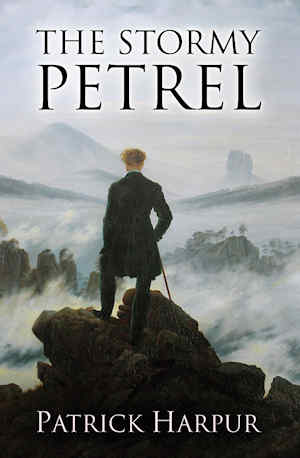
The Stormy Petrel
Published by The
Squeeze Press, 2017
Outcast from society, his health - and heart - broken, the anguished
figure of K
paces the rooms of his great house, pausing to scribble
furiously at a lectern....
Only Victor knows that beneath K's public
guise as an idle dilettante, lies a genius who has been fired by an
unholy secret into creating a new kind of philosophy, where thought is
passionately infused with personal experience.
Based
on the life of the Danish thinker, Soren Kierkegaard (1813-55), who
asserted that when he died 'there will not be found one single word to
indicate what my life was really about', The Stormy Petrel is precisely
the inside story of what his life is about - an investigation into a
soul torn between natural love and a supernatural vocation, which leads
inexorably to the attack that makes his name anathema for a hundred
years.
Author's note:
As a
rule, I don't much like novels which fictionalise real people, but I
felt compelled to make an exception in this case because of the way
Kierkegaard's life and thought - as befits the 'Father of
Existentialism' - are plaited together. I believed that a book written
as if through his eyes - as if by him - would do him greater justice
than any book about him.
In
his time Kierkegaard cut a bizarre figure, walking about the town,
engaging the populace in conversation and philosophical debate. He was
popular, known for his generosity, and welcome everywhere. But then came
a scandalous love affair; and, when a scurrilous newspaper caricatured
him and vilified his writing, the people turned on him and he was
ridiculed. He became the first 'celebrity' to be martyred by the
'tabloid press'; and the first to recognise the abstract power of a
Public created by a mass media. He retreated into obscurity, writing
under a series of pseudonyms and emerging only to cause a national
furore. He died in hospital, aged 42, of an uncertain illness.
Beneath the surface of events, there was another story. When we read
contemporary descriptions of Kierkegaard, the extraordinary thing is
that we get no insight into his real nature, except one: the degree to
which he concealed that nature. We know this from his Journals, which
reveal that the face of the cheerful, witty idler he took pride in
presenting to the world masked an inner torment rooted in a terrible
secret imparted to him by his father. He called it 'the Earthquake'.
Unable to initiate the girl he adored into this secret - the source of
his lifelong melancholy - he was forced to give her up; or, worse, to
force her to give him up in order to preserve her honour, all the while
playing the heartless rake. His hopes for marriage and a normal life
dashed, he began to write and write: not since Socrates or St Augustine
do we get so strong an impression of a man philosophising for his life.
Thinking, in other words, was not incidental to his life, as it was to
the academic philosophers he satirised, but central - he was
passionately engaged in thinking about existence while deeply embedded
in existence.
Taking its cue from Kierkegaard himself, who asserted that when he died
'there will not be found one single word to indicate what my life was
all about,' The Stormy Petrel is in part an investigation, like a
detective story, of what his life was all about - and of the source of
his melancholy.
In
the end, Kierkegaard went beyond philosophy and made a leap - not just
his celebrated 'leap of faith', but also a leap into action: a witty and
scathing attack on the Church and its leaders which led many to account
him mad; but which sanely anticipated the modern decline of Christianity
and rise of secularism. In a novel, such leaps can be not merely
described but enacted by a narrative device I don't reveal until the
end.